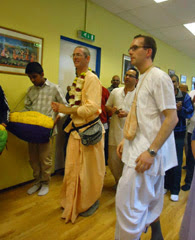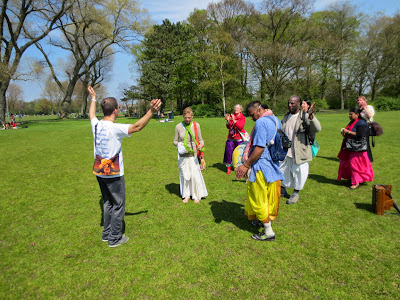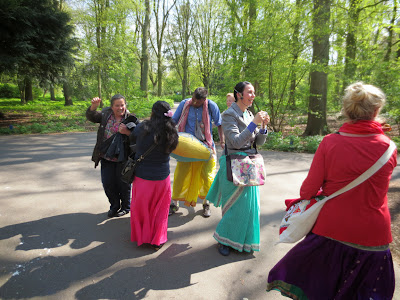19 June 2013 – Ganga Puja
Second Chapter, Second Canto – Finished
→ Bhagavatam By Braja
To celebrate finishing the presentation of the Second Chapter of the Second Canto – here is an excerpt, one of my favorite śloka from this chapter
35
Parīkṣit: These yogīs you described, how do they love the All-Attractive?
Śuka: They experience All-Attractive Hari by his qualities present within the core of all living beings.
Parīkṣit: What qualities?
Śuka: The qualities of consciousness. Yogīs know that they are conscious – they can see, experience, and comprehend. Everything they see, experience and comprehend also has this divine quality, consciousness. Thus they inferentially experience the All-Attractive divine everywhere.
ISKCON Scarborough- Live radio program with HG Uttama Sloka das
→ ISKCON Scarborough
ISKCON Scarborough- Live radio program with HG Uttama Sloka das
→ ISKCON Scarborough
ISKCON Scarborough- 4th Annual Harinam Sankirtan cruise- Kirtan by Gaura Shakti yoga group
→ ISKCON Scarborough
ISKCON Scarborough- 4th Annual Harinam Sankirtan cruise- Kirtan by Gaura Shakti yoga group
→ ISKCON Scarborough
2013 06 06 Srimad Bhagavatam 10 20 39 40 Steps to remove False Ego Dayal Chandra Prabhu
→ Gouranga TV - The Hare Krishna video collection
2013 06 06 Srimad Bhagavatam 10 20 39 40 Steps to remove False Ego Dayal Chandra Prabhu
a win-win situation
→ everyday gita
Today was a day of productive reflection for me. Despite it being Saturday, I was able to knock off several things from my to-do list. Item 2 was taking time out to introspect and take stock of everything that's been going on lately.
One of my contemplations was the fact that often we are presented with lose-lose scenarios. We may want to speak the truth, but it's at the cost of a friendship or we may want to pursue our particular path in life but it's at the disapproval of friends and loved ones. There are innumerable scenarios such as these that we encounter and it's often hard to swallow.
Now if you were presented with a win-win situation, wouldn't you just jump at it? That's exactly what working in gratitude is all about. Right now, whether we are conscious of it or not, many of us perform work with the intention of enjoying the results. Looking at it from a subjective perspective, it actually seems quite reasonable. After all, if we put in the effort and time to do something, it only seems fair that get to take credit for the outcome, right?
That perspective is just a snapshot. It's not a holistic picture of what is actually going on. Most of us in fact realize that the talents and abilities that we use to perform our work are blessings from the Supreme. However, the challenge is in actually recognizing and acknowledging that on a day to day basis. Granted, it's hard to do so when we are constantly bombarded by material society trying to convince us that we are in control and everything is "mine".
Constant exposure to this type of consciousness can make us forget that:
Our talents, abilities and gifts are all blessings that have been given to us by the Divine.
Bhakti yoga helps us clear away the fog of misconception that we are in control. It reminds us that life is about connection, service and gratitude. By living our lives in such a way, we start to re-connect with our selves and the Divine in a spirit of appreciation.
That's choosing the win-win option.
Whatever work we perform carries with it some karma, whether it be good or bad. That karma binds us to the temporary, material body. Instead, we can continue to perform work but with the consciousness of offering it as our appreciation to the Divine for everything He has given us. By shifting our consciousness to one of gratitude, we incur NO karma. That's right...no more ties to temporary, material world!
Such win-win situations are very rare. The best part about this one is the fact that nothing externally changes. It's all about what's going on inside - in your heart and in your mind. The option is out there. Will you choose win-win?
a win-win situation
→ everyday gita
Today was a day of productive reflection for me. Despite it being Saturday, I was able to knock off several things from my to-do list. Item 2 was taking time out to introspect and take stock of everything that's been going on lately.
One of my contemplations was the fact that often we are presented with lose-lose scenarios. We may want to speak the truth, but it's at the cost of a friendship or we may want to pursue our particular path in life but it's at the disapproval of friends and loved ones. There are innumerable scenarios such as these that we encounter and it's often hard to swallow.
Now if you were presented with a win-win situation, wouldn't you just jump at it? That's exactly what working in gratitude is all about. Right now, whether we are conscious of it or not, many of us perform work with the intention of enjoying the results. Looking at it from a subjective perspective, it actually seems quite reasonable. After all, if we put in the effort and time to do something, it only seems fair that get to take credit for the outcome, right?
That perspective is just a snapshot. It's not a holistic picture of what is actually going on. Most of us in fact realize that the talents and abilities that we use to perform our work are blessings from the Supreme. However, the challenge is in actually recognizing and acknowledging that on a day to day basis. Granted, it's hard to do so when we are constantly bombarded by material society trying to convince us that we are in control and everything is "mine".
Constant exposure to this type of consciousness can make us forget that:
Our talents, abilities and gifts are all blessings that have been given to us by the Divine.
Bhakti yoga helps us clear away the fog of misconception that we are in control. It reminds us that life is about connection, service and gratitude. By living our lives in such a way, we start to re-connect with our selves and the Divine in a spirit of appreciation.
That's choosing the win-win option.
Whatever work we perform carries with it some karma, whether it be good or bad. That karma binds us to the temporary, material body. Instead, we can continue to perform work but with the consciousness of offering it as our appreciation to the Divine for everything He has given us. By shifting our consciousness to one of gratitude, we incur NO karma. That's right...no more ties to temporary, material world!
Such win-win situations are very rare. The best part about this one is the fact that nothing externally changes. It's all about what's going on inside - in your heart and in your mind. The option is out there. Will you choose win-win?
Hari’s Restaurant
→ Ramai Swami

Hari’s Vegetarian Restaurant is the new restaurant that was opened by the Sydney Temple around 3 months ago. It is located in the Broadway area of Sydney, about a block from the University of Technology Sydney and half a kilometre from Sydney University.
Needless to say, the area is mainly inhabited by students who attend these two colleges. The restaurant operates seven days a week and even though it has only been open a short time it is growing very quickly in popularity.
It is overseen by Sudarshan Prabhu who lives at the temple and staffed by devotee cooks such as, Jitendriya, Karunamoya, Govinda and Mohit. Other devotees also come and help out with various services that are needed. The menu is a tantalising fusion of western and Indian type of vegetarian foods, all offered to the Supreme Lord.
Mahendraparvata, 1,200-Year-Old Lost Medieval City In Cambodia, Unearthed By Archaeologists
→ Vedicarcheologicaldiscoveries's Weblog
A lost medieval city that thrived on a mist-shrouded Cambodian mountain 1,200 years ago has been discovered by archaeologists using revolutionary airborne laser technology, a report said.
In what it called a world exclusive, the Sydney Morning Herald said the city, Mahendraparvata, included temples hidden by jungle for centuries, many of which have not been looted.
A journalist and photographer from the newspaper accompanied the “Indiana Jones-style” expedition, led by a French-born archaeologist, through landmine-strewn jungle in the Siem Reap region where Angkor Wat, the largest Hindi temple complex in the world, is located.
The expedition used an instrument called Lidar — light detection and ranging data — which was strapped to a helicopter that criss-crossed a mountain north of Angkor Wat for seven days, providing data that matched years of ground research by archaeologists.
It effectively peeled away the jungle canopy using billions of laser pulses, allowing archaeologists to see structures that were in perfect squares, completing a map of the city which years of painstaking ground research had been unable to achieve, the report said.
It helped reveal the city that reportedly founded the Angkor Empire in 802 AD, uncovering more than two dozen previously unrecorded temples and evidence of ancient canals, dykes and roads using satellite navigation coordinates gathered from the instrument’s data.
Jean-Baptiste Chevance, director of the Archaeology and Development Foundation in London who led the expedition, told the newspaper it was known from ancient scriptures that a great warrior, Jayavarman II, had a mountain capital, “but we didn’t know how all the dots fitted, exactly how it all came together”.
“We now know from the new data the city was for sure connected by roads, canals and dykes,” he said.
The discovery is set to be published in the Proceedings of the National Academy of Sciences in the United States.
Damian Evans, director of the University of Sydney’s archaeological research centre in Cambodia, which played a key part in developing the Lidar technology, said there might be important implications for today’s society.
“We see from the imagery that the landscape was completely devoid of vegetation,” Evans, a co-expedition leader, said.
“One theory we are looking at is that the severe environmental impact of deforestation and the dependence on water management led to the demise of the civilisation … perhaps it became too successful to the point of becoming unmanageable.”
The Herald said the trek to the ruins involved traversing rutted goat tracks and knee-deep bogs after travelling high into the mountains on motorbikes.
Everyone involved was sworn to secrecy until the findings were peer-reviewed.
Evans said it was not known how large Mahendraparvata was because the search had so far only covered a limited area, with more funds needed to broaden it out.
“Maybe what we see was not the central part of the city, so there is a lot of work to be done to discover the extent of this civilisation,” he said.
“We need to preserve the area because it’s the origin of our culture,” secretary of state at Cambodia’s Ministry of Culture, Chuch Phoeun, told AFP.
Angkor Wat was at one time the largest pre-industrial city in the world, and is considered one of the ancient wonders of the world.
It was constructed from the early to mid 1100s by King Suryavarman II at the height of the Khmer Empire’s political and military power.
“Love and Trust” is Developed, Maintained, or Depleted, by our “Emotional Bank Accounts”
→ Karnamrita.das's blog
(this blog is recorded on the full page: quick time player needed; works best with Firefox or Explorer)

While we often hear Shrila Prabhupada’s statement that “our relationships should be based on love and trust,” we don’t often expand on how this can be created and maintained. One process I have found helpful is something we teach in our relationship seminars, namely the practice of checking the balance in the “Emotional Bank Account” that we have with another person—do we have a surplus of positive emotions, or are we overdrawn, in the red?
This is a metaphor that Stephen Covey [The Seven Habits of Highly Effective People] first came up with to describe "the amount of trust that’s been built up in a relationship." This statement really piqued my curiosity and interest in his work, and after scrutiny, dovetails nicely as a support to putting into practice Prabhupada’s aphorism. Just as we have bank accounts to keep our money in, we also have “bank accounts” to store our “emotional capital” or the energy that sustains or strains (if it becomes depleted) relationships.

We could also consider this capital like a trust meter, and trust is the basis of reciprocal loving dealings. Very few people love unconditionally, but most of us require more positive interactions (deposits), than negative ones (withdrawals), to stay, or be happy, in a relationship.
“Love and Trust” is Developed, Maintained, or Depleted, by our “Emotional Bank Accounts”
→ Karnamrita.das's blog
(this blog is recorded on the full page: quick time player needed; works best with Firefox or Explorer)

While we often hear Shrila Prabhupada’s statement that “our relationships should be based on love and trust,” we don’t often expand on how this can be created and maintained. One process I have found helpful is something we teach in our relationship seminars, namely the practice of checking the balance in the “Emotional Bank Account” that we have with another person—do we have a surplus of positive emotions, or are we overdrawn, in the red?
This is a metaphor that Stephen Covey [The Seven Habits of Highly Effective People] first came up with to describe "the amount of trust that’s been built up in a relationship." This statement really piqued my curiosity and interest in his work, and after scrutiny, dovetails nicely as a support to putting into practice Prabhupada’s aphorism. Just as we have bank accounts to keep our money in, we also have “bank accounts” to store our “emotional capital” or the energy that sustains or strains (if it becomes depleted) relationships.

We could also consider this capital like a trust meter, and trust is the basis of reciprocal loving dealings. Very few people love unconditionally, but most of us require more positive interactions (deposits), than negative ones (withdrawals), to stay, or be happy, in a relationship.
Nrsimha Chaturdashi 2013 – Sandhya Arati
→ Gouranga TV - The Hare Krishna video collection
Nrsimha Chaturdashi 2013 – Sandhya Arati
Cooking Classes
→ The Loft Yoga Lounge Auckland
New Vegan/Vegetarian Cooking classes Every fortnight on Fridays at 6pm This week, Friday 5th July, it is with Madhava sangani (Meredith) …………………………………………... Theme this week: Gluten Free Buckwheat Crepes, Buckwheat crackers Roasted beetroot dip Raw cashew cheese Salad (for serving with the crepes) Banana surprise Remember BOOK NOW – parking is free after 6pm and only [...]
The post Cooking Classes appeared first on The Loft Yoga Lounge Auckland.
June 13, ’13 Photos
→ Krishna Lounge
May 31, 13 Candle Light Kirtana Photos
→ Krishna Lounge
June 6, ’13 Photos
→ Krishna Lounge
air freshener anyone? living under the influence…
→ everyday gita
There is a phrase that the great bhakti yogi, Srila Prabhupada, often uses in reference to the soul. That phrase is:
"one's constitutional position"
I love this description because it strips away everything that is irrelevant and gives us the essence. Sometimes, when things are wrapped up in nice and glitzy packages, we get distracted. Case in point - many of us are so fixated on the body with all it's functions, abilities and appearance that we may forget what's really important - the soul inside.
Equally important to realizing that we are eternal souls, is the nature of the soul. Its nature can be summed up in two words: to serve.
Everything really falls in place if we understand these two points of service and the soul. Our desire to find our true calling and contribute to the world is in fact rooted in our innate nature to serve.
But...we face a challenge. We encounter it on a minute to minute basis and may not realize that it is in direct opposition to the soul's propensity and inherent nature of service. That challenge is otherwise known as: the false ego.
The false ego is like a voracious eater and the food it subsists on is control and recognition. Now before going any further, it's important to highlight that desiring control and recognition is not wrong or negative. It does, however, become a challenge when the false ego, which is always screaming to take credit of all activities that are being performed, interferes with our inherent nature to appreciate and recognize the Divine.
In fact, the soul doesn't crave recognition, control or anything else. It simply craves eternal and ever-lasting love. Under the influence of the false ego, we get bewildered into thinking that these other externals may somehow lead to that love.
In today's verse, Krsna is very beautifully explaining how the false ego affects us. It acts as an influence. That in and of itself gives great hope for all those who want to be freed from the tyrannical demands of the false ego. If the soul is under the influence of the false ego, it implies that the soul can also become freed from it!
Just as the air takes on the smell of any environment that it passes over, similarly the soul (having been in contact with the false ego for so many lifetimes) also takes on the influence of the false ego's association.
The temptation may be there to cover up the outward manifestations of the false ego, similar to trying to cover up a bad odor with a pleasant one. However, it just doesn't work. It may be a temporary fix, but those tendencies always comes out, often at the most inopportune times!
The only way to give up the influence of the false ego is by changing our association. By practicing mantra meditation, introspection and spending time with advanced bhakti yogis, we'll start to recognize the stink of the false ego. After all, it's only when you recognize the stink that you'll want to disassociate from it! By becoming aware of the ways that the false ego lures us in, we'll learn to not only ignore it, but gradually give up it's association completely.
air freshener anyone? living under the influence…
→ everyday gita
There is a phrase that the great bhakti yogi, Srila Prabhupada, often uses in reference to the soul. That phrase is:
"one's constitutional position"
I love this description because it strips away everything that is irrelevant and gives us the essence. Sometimes, when things are wrapped up in nice and glitzy packages, we get distracted. Case in point - many of us are so fixated on the body with all it's functions, abilities and appearance that we may forget what's really important - the soul inside.
Equally important to realizing that we are eternal souls, is the nature of the soul. Its nature can be summed up in two words: to serve.
Everything really falls in place if we understand these two points of service and the soul. Our desire to find our true calling and contribute to the world is in fact rooted in our innate nature to serve.
But...we face a challenge. We encounter it on a minute to minute basis and may not realize that it is in direct opposition to the soul's propensity and inherent nature of service. That challenge is otherwise known as: the false ego.
The false ego is like a voracious eater and the food it subsists on is control and recognition. Now before going any further, it's important to highlight that desiring control and recognition is not wrong or negative. It does, however, become a challenge when the false ego, which is always screaming to take credit of all activities that are being performed, interferes with our inherent nature to appreciate and recognize the Divine.
In fact, the soul doesn't crave recognition, control or anything else. It simply craves eternal and ever-lasting love. Under the influence of the false ego, we get bewildered into thinking that these other externals may somehow lead to that love.
In today's verse, Krsna is very beautifully explaining how the false ego affects us. It acts as an influence. That in and of itself gives great hope for all those who want to be freed from the tyrannical demands of the false ego. If the soul is under the influence of the false ego, it implies that the soul can also become freed from it!
Just as the air takes on the smell of any environment that it passes over, similarly the soul (having been in contact with the false ego for so many lifetimes) also takes on the influence of the false ego's association.
The temptation may be there to cover up the outward manifestations of the false ego, similar to trying to cover up a bad odor with a pleasant one. However, it just doesn't work. It may be a temporary fix, but those tendencies always comes out, often at the most inopportune times!
The only way to give up the influence of the false ego is by changing our association. By practicing mantra meditation, introspection and spending time with advanced bhakti yogis, we'll start to recognize the stink of the false ego. After all, it's only when you recognize the stink that you'll want to disassociate from it! By becoming aware of the ways that the false ego lures us in, we'll learn to not only ignore it, but gradually give up it's association completely.
Nrsimha Chaturdashi 2013 – HG Urmila Mataji
→ Gouranga TV - The Hare Krishna video collection
Nrsimha Chaturdashi 2013 – HG Urmila Mataji
ISKCON Scarborough- 4th Annual Harinam Sankirtan cruise- Kirtan by HG Ajamil das prabhu
→ ISKCON Scarborough
ISKCON Scarborough- 4th Annual Harinam Sankirtan cruise- Kirtan by HG Ajamil das prabhu
→ ISKCON Scarborough
ISKCON Sankirtan cruise- Kirtan by HG Gaura das
→ ISKCON Scarborough
ISKCON Sankirtan cruise- Kirtan by HG Gaura das
→ ISKCON Scarborough
Devotional Service Committee (DSC) meeting on Saturday June 15th @ 11:00 am
→ ISKCON BRAMPTON'S BLOG
Sunday Feast, June 16th @ 11:00am

The program consists of arati, kirtan (devotional chanting), philosophical discussion and prasadam. Please come, get inspired and inspire others through your desire to share Krsna Consciousness!
Program Schedule:
11:00 am - 11:30 am Guru Puja
11:30 am - 12:00 pm Arati & Kirtan
12:00 pm – 12:05 pm Narasingadev Prayers
12:10 pm - 1:00 pm Vedic Discourse by His Grace Subhavilasa Prabhu
1:20 pm - 2:00 pm Prasadam (Vegetarian feast)
Upcoming event:
Sunday School Picture Day - June 23rd 2013
Bring your smiles and finest Vaisnava attire! (dhoti, kurta, lengha/gopi dress, tilak)
For more information, please contact the Sunday School teachers -sundayschool108@gmail.com
Devotional Service Committee (DSC) meeting on Saturday June 15th @ 11:00 am
→ ISKCON BRAMPTON'S BLOG
Sunday Feast, June 16th @ 11:00am

The program consists of arati, kirtan (devotional chanting), philosophical discussion and prasadam. Please come, get inspired and inspire others through your desire to share Krsna Consciousness!
Program Schedule:
11:00 am - 11:30 am Guru Puja
11:30 am - 12:00 pm Arati & Kirtan
12:00 pm – 12:05 pm Narasingadev Prayers
12:10 pm - 1:00 pm Vedic Discourse by His Grace Subhavilasa Prabhu
1:20 pm - 2:00 pm Prasadam (Vegetarian feast)
Upcoming event:
Sunday School Picture Day - June 23rd 2013
Bring your smiles and finest Vaisnava attire! (dhoti, kurta, lengha/gopi dress, tilak)
For more information, please contact the Sunday School teachers -sundayschool108@gmail.com
These things happen
→ Jayadvaita Swami
This letter was sent to me and Dravida Dasa, the chief editor at the North American BBT.
Respected Maharaj and Prabhu,
Please accept my humble obeisances. All glories to Srila Prabhupada.
I request to read the following purport of SB 9.10.29
“After giving up the body, one is transferred to another body, but sometimes, if one is too sinful, he is checked from transmigrating to another body, and thus he becomes a ghost. To save a diseased person from ghostly life, the funeral ceremony, or sraddha ceremony, as prescribed in authorized sastra, must be performed. Ravana was killed by Lord Ramacandra and was destined for hellish life, but by Lord Ramacandra’s advice, Vibhisana, Ravana’s brother, performed all the duties prescribed in relation to the dead. Thus Lord Ramacandra was kind to Ravana even after Ravana’s death.”
Shouldn’t the word “diseased” be “deceased”?
Your servant,
Anuj Agrawal
Banswara
Rajasthan, India
Yes, it certainly should!
(This will be fixed in the next printing.)
The post These things happen appeared first on Jayadvaita Swami.
These things happen
→ Jayadvaita Swami
Respected Maharaj and Prabhu, Please accept my humble obeisances. All glories to Srila Prabhupada. I request to read the following purport of SB 9.10.29 “After giving up the body, one is transferred to another body, but sometimes, if one is too sinful, he is checked from transmigrating to another body, and thus he becomes a ghost. To save a diseased person from ghostly life, the funeral ceremony, or sraddha ceremony, as prescribed in authorized sastra, must be performed. Ravana was killed by Lord Ramacandra and was destined for hellish life, but by Lord Ramacandra’s advice, Vibhisana, Ravana’s brother, performed all the duties prescribed in relation to the dead. Thus Lord Ramacandra was kind to Ravana even after Ravana’s death.” Shouldn’t the word “diseased” be “deceased”? Your servant, Anuj Agrawal Banswara Rajasthan, IndiaYes, it certainly should! (This will be fixed in the next printing.)
These things happen
→ Jayadvaita Swami
This letter was sent to me and Dravida Dasa, the chief editor at the North American BBT.
Respected Maharaj and Prabhu,
Please accept my humble obeisances. All glories to Srila Prabhupada.
I request to read the following purport of SB 9.10.29
“After giving up the body, one is transferred to another body, but sometimes, if one is too sinful, he is checked from transmigrating to another body, and thus he becomes a ghost. To save a diseased person from ghostly life, the funeral ceremony, or sraddha ceremony, as prescribed in authorized sastra, must be performed. Ravana was killed by Lord Ramacandra and was destined for hellish life, but by Lord Ramacandra’s advice, Vibhisana, Ravana’s brother, performed all the duties prescribed in relation to the dead. Thus Lord Ramacandra was kind to Ravana even after Ravana’s death.”
Shouldn’t the word “diseased” be “deceased”?
Your servant,
Anuj Agrawal
Banswara
Rajasthan, India
Yes, it certainly should!
(This will be fixed in the next printing.)
Nrsimha Chaturdashi 2013 – Drama
→ Gouranga TV - The Hare Krishna video collection
Nrsimha Chaturdashi 2013 – Drama
ISKCON Scarborough- 4th Annual Harinam Sankirtan cruise – Kirtan by HG Jagannath Misra das
→ ISKCON Scarborough
ISKCON Scarborough- 4th Annual Harinam Sankirtan cruise – Kirtan by HG Jagannath Misra das
→ ISKCON Scarborough
ISKCON Scarborough- 4th Annual Harinam Sankirtan cruise- Interviews with Devotees
→ ISKCON Scarborough
ISKCON Scarborough- 4th Annual Harinam Sankirtan cruise- Interviews with Devotees
→ ISKCON Scarborough
think before you speak
→ everyday gita
Ever get so excited about something that when you get a chance to talk about it with others you just talk their head off? If so, you're not alone!
In some cases though, you may find out that the person you were speaking to got turned off by your rambling because they just couldn't relate to what you were saying.
At some point in time our lives, I think most of us have been both the source of such over-exuberance and the recipient of it! Today's verse speaks to this type of situation by offering some extremely practical advice to the super excited individual who is just bursting at the seams to speak:
Think before you speak.
Communications 101 teaches us that knowing your audience is just as important as how, what and why you're sharing information. The most effective communication occurs when we address the needs, interests and concerns of whoever we are talking to. Also extremely important is the relationship we have with the person we are conversing with.
Here, the Gita is saying that it takes time to understand bhakti. That's why it's important to start at the beginning. If you recall, one of the key topics Krsna speaks to Arjuna about (the first being the importance of the soul), is the necessity of working according to one's nature. Note: Krsna did not advice Arjuna to give up everything and run away to the forest to meditate.
Essentially, Krsna addressed Arjuna's needs, interests and concerns on a very practical level. Now as we continue to journey through the Gita, we'll learn more about the intricate nature of bhakti and how the most advanced bhakti yogis are not obligated work. But....that takes time, knowledge and the practical and steady application of the bhakti process.
Sometimes when we get really excited or inspired, we can overwhelm our listeners. What I love about this verse is that it's so applicable and relevant in our everyday lives. After all...I don't think anyone can argue that it's always best to think before we speak
Death of a Yogi
→ Bhagavatam By Braja
This is a partial excerpt from the manuscript to Beautiful Tales of the All Attractive, Vol. 2 – the topic at hand does continue past the end of the excerpt.
 19-21
19-21
Parīkṣit: Please explain how those yogīs actually discard the body.
Śuka: They sit with the heel pressing the rectum so their life-air[1] can rise through the six stations, conquering weariness.
The thoughtful use their intelligence to gradually draw out and raise their life-air from the navel to the heart, and then upwards to the chest and throat. Finally, they bring their life-air between their eyebrows and close all the seven bodily outlets completely. Existing for half a moment in this independent state, they set their sights upon Viṣṇu’s worriless position and give up their body by bursting out from the top of the head, towards that supreme destination.
22
Parīkṣit: Do they make it successfully all the way to the supreme destination?
Śuka: Not if they still have personal ambitions, O King. On the path to the supreme they might want to use their mind and sensual faculties to enjoy the multifaceted world as supernatural beings who have eight mystic powers.
23
Parīkṣit: How is this different than the paradisiac goal achieved by ritual and responsibility?
Śuka: Yogic masters who have cultivated knowledge, austerity, yoga, and meditation can attain material destinations without being limited to them. They continue to progress within and beyond these destinations in a purified, subtle body. Those who perform the rituals and responsibilities of karma cannot attain such perfection.
24
Parīkṣit: How do they continue moving towards the supreme destination?
Śuka: They reach the heavens, where the Sun presides, by traversing the path of space. Then they follow the Sun’s ray towards to Moon[2] and progress further on the path towards Brahmā. Finally, when they are completely pure, they move upwards into Hari’s circle of stars.[3]
[1] The life air is the medium transmitting consciousness to the physical realm. So “raising the life-air” amounts to raising the focus of consciousness.
[2] Suṣumṇa
[3] Śiśumāra
The Death of a Yogi
→ The Enquirer
This is a partial excerpt from the manuscript to Beautiful Tales of the All Attractive, Vol. 2 – the topic at hand does continue past the end of the excerpt.
 19-21
19-21
Parīkṣit: Please explain how those yogīs actually discard the body.
Śuka: They sit with the heel pressing the rectum so their life-air[1] can rise through the six stations, conquering weariness.
The thoughtful use their intelligence to gradually draw out and raise their life-air from the navel to the heart, and then upwards to the chest and throat. Finally, they bring their life-air between their eyebrows and close all the seven bodily outlets completely. Existing for half a moment in this independent state, they set their sights upon Viṣṇu’s worriless position and give up their body by bursting out from the top of the head, towards that supreme destination.
22
Parīkṣit: Do they make it successfully all the way to the supreme destination?
Śuka: Not if they still have personal ambitions, O King. On the path to the supreme they might want to use their mind and sensual faculties to enjoy the multifaceted world as supernatural beings who have eight mystic powers.
23
Parīkṣit: How is this different than the paradisiac goal achieved by ritual and responsibility?
Śuka: Yogic masters who have cultivated knowledge, austerity, yoga, and meditation can attain material destinations without being limited to them. They continue to progress within and beyond these destinations in a purified, subtle body. Those who perform the rituals and responsibilities of karma cannot attain such perfection.
24
Parīkṣit: How do they continue moving towards the supreme destination?
Śuka: They reach the heavens, where the Sun presides, by traversing the path of space. Then they follow the Sun’s ray towards to Moon[2] and progress further on the path towards Brahmā. Finally, when they are completely pure, they move upwards into Hari’s circle of stars.[3]
[1] The life air is the medium transmitting consciousness to the physical realm. So “raising the life-air” amounts to raising the focus of consciousness.
[2] Suṣumṇa
[3] Śiśumāra
Travel Journal#9.9: Holland, London, The North of England, Northern Ireland
→ Travel Adventures of a Krishna Monk
By Krishna-kripa das
(May 2013, part one)
The man also knew of Inis Rath island and their Sunday feast, and the lady in the office lived in Dunmurry, the Belfast suburb where our temple is, and she knew of our Sunday program there.
Travel Journal#9.9: Holland, London, The North of England, Northern Ireland
→ Travel Adventures of a Krishna Monk
By Krishna-kripa das
(May 2013, part one)
The man also knew of Inis Rath island and their Sunday feast, and the lady in the office lived in Dunmurry, the Belfast suburb where our temple is, and she knew of our Sunday program there.



































